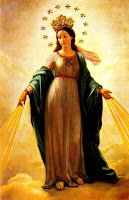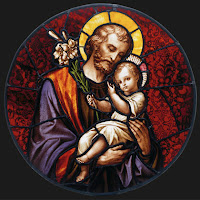Praised
be Jesus, Mary, and Joseph!
 The
sight will never fail to strike a sensitive chord in the human heart: a mother
burying her son. It is easier to look at a son burying his mother (for is this
not supposed to be: that the mother dies before her son?) The huge crowd in the
funeral procession was a show of sympathy for the mother. The sight definitely
touched the heart of the Lord: When the Lord saw her, he was moved with pity
for her. Out of pity, the Lord touched the coffin. What he did was a no-no for
anyone who touches a corpse is defiled by the corpse. In the Mosaic
law, contact with a dead body renders an Israelite unclean for a week (Numbers 19:11-19). Jesus’
touch and word reverses that; instead of being defiled by contact with death,
he gave life. The Lord could not be
defiled by a corpse. He is God –he is not defiled by death. He conquers death
and subjects it to himself. Notice that in the 1st reading, Elijah
called out to the Lord: “O Lord, my God, let the life breath return to the body
of this child.” Jesus, however, commands the corpse: “Young man, I tell you,
arise!” He resurrects the dead by his own authority: “The dead shall hear the
voice of the Son of man, and they shall rise out of their tombs.” He is Lord of
life.
The
sight will never fail to strike a sensitive chord in the human heart: a mother
burying her son. It is easier to look at a son burying his mother (for is this
not supposed to be: that the mother dies before her son?) The huge crowd in the
funeral procession was a show of sympathy for the mother. The sight definitely
touched the heart of the Lord: When the Lord saw her, he was moved with pity
for her. Out of pity, the Lord touched the coffin. What he did was a no-no for
anyone who touches a corpse is defiled by the corpse. In the Mosaic
law, contact with a dead body renders an Israelite unclean for a week (Numbers 19:11-19). Jesus’
touch and word reverses that; instead of being defiled by contact with death,
he gave life. The Lord could not be
defiled by a corpse. He is God –he is not defiled by death. He conquers death
and subjects it to himself. Notice that in the 1st reading, Elijah
called out to the Lord: “O Lord, my God, let the life breath return to the body
of this child.” Jesus, however, commands the corpse: “Young man, I tell you,
arise!” He resurrects the dead by his own authority: “The dead shall hear the
voice of the Son of man, and they shall rise out of their tombs.” He is Lord of
life.
Death
defiles man. “The Church’s Magisterium…teaches that death entered the world on
account of man’s sin. Even though man’s nature is mortal, God has destined him
not to die. Death was therefore contrary to the plans of God the Creator, and
entered the world as a consequence of sin.” (CCC1008) Christ allowed himself to
be touched by death itself. “Jesus, the Son of God, also himself suffered the
death that is part of the human condition. Yet, despite his anguish as he faced
death, he accepted it in an act of complete and free submission to his Father’s
will. The obedience of Jesus has transformed the curse of death into a
blessing.” (CCC 1009) Though he was touched by death, Jesus was not defiled by
death. His obedience, his loving and absolute submission to the Father took
away the sting of death. “Through Baptism, the Christian has already died with
Christ sacramentally in order to live a new life; and if we die in Christ’s grace,
physical death completes this ‘dying with Christ’ and so completes our
incorporation into him in this redeeming act.” (CCC1010)
Because
Christ obediently accepted death on a Cross, he transformed death. Following
the example of Christ, we can transform our own death into an act of obedience
and love towards the Father (cf. CCC 1011) In this transformation, death does
not become a sad end to existence. Rather, it becomes an entrance into life.
Death no longer becomes a violent separation from those we love. Rather, it
becomes a joyful reunion with the Father who loves us and calls us to himself.
At her death bed, St. Therese of the Child Jesus said, “I am not dying; I am
entering life!”
Jesus,
I trust in you! O Mary conceived without sin, pray for us who have recourse to
thee!



















